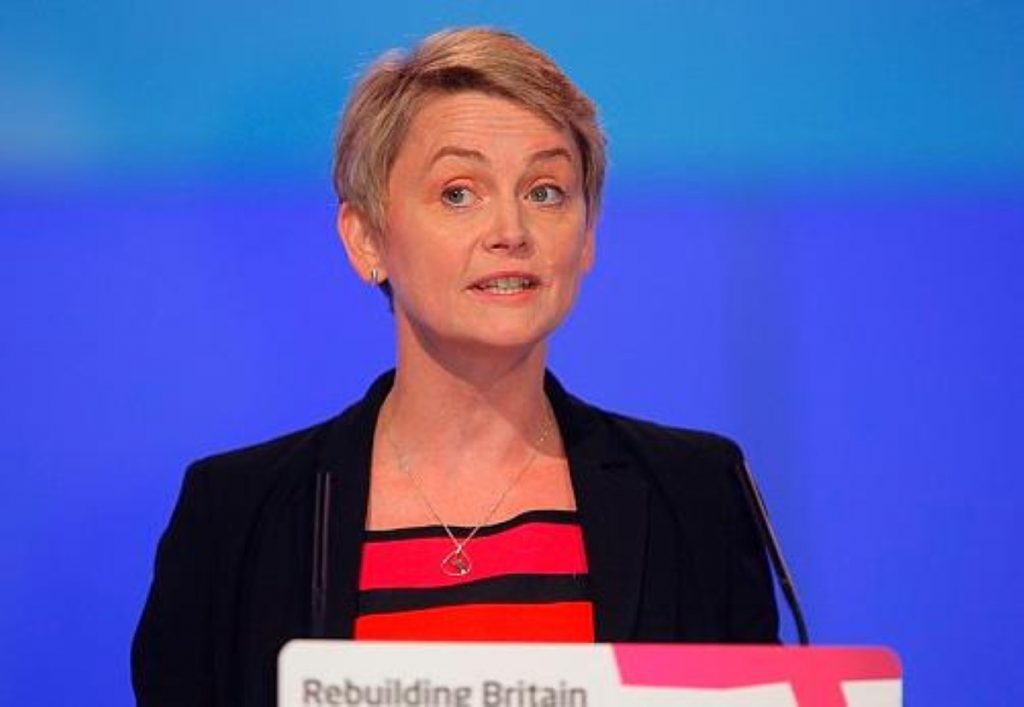Sketch: Cooper unites Labour’s plebs
Ed Balls' other half is becoming an imposing figure on the landscape of the left – even if she did use a lectern for her conference speech in Manchester this morning.
Yvette Cooper is an impressive specimen. The meaty, low tone of her voice is well-suited to big speeches. She is substantial in style but not in person. In opposition her moral righteousness must be insufferable to Theresa May, a politician from a slightly older generation but of the same mould. Ghastly though it may be to note, she is feminine. These things ought not to matter in politics, but they do.
We were supposed to be writing about this speech on the basis of rumours that Cooper's husband, the shadow chancellor Ed Balls, has decided to dethrone Ed Miliband and place her on top of the Labour tree instead. After the Labour leader's barnstormer of a speech yesterday, that is now out of the question.
Still, it was interesting to note the ease with which she tickled Labour's tummy. Cooper thanked the staff of G4S for working so hard during the Olympics, despite the poor work of their managers. She called for "plebs of the worlds" to unite after chief whip Andrew Mitchell's Downing Street police-bashing. Labour views the police as public servants. "He thought they were just servants!" The delegates sitting near me roared with appreciative laughter.


Cooper extended the breadth of her speech to the utmost range of the home affairs portfolio. Phone-hacking got a mention, as did the Libor scandal. This is a common tactic among those keen to avoid presenting themselves as being restricted to a single policy area – the Conservatives' Michael Gove is well-practised at this – and her speech will, after all, have been prepared before Miliband's effort yesterday.
Let's not get carried away, though. Cooper rallied to the 'one nation' message and declared Ed Miliband to be Britain's next prime minister. De rigeur for an opposition frontbencher, but this speech shouldn't be interpreted as a manoeuvring of its own. Cooper is not Vince Cable.
The home affairs brief contains challenges of its own. On immigration, Cooper admitted that the New Labour government had "got things wrong". Now the party needs to "listen and learn", she purred soothingly. Then came a sudden hardening. "Britain does need stronger controls and limits to make the system fair." Miliband has given Cooper a green light to march off to the right on law and order – a process the party was in the middle of, anyway, as this November's police and crime commissioner elections loom.
Painting the hall red
Throughout this conference Labour has taken the improbable decision to daub its conference in a blue tone, using the Union Jack as an excuse to ape Tory colours. Labour has tried using a variety of garish reds and purples over the years – but this was, surely, a first. As it turns out, blue was the perfect colour for a Miliband speech deliberately designed to tread on Cameron's toes.
Only one man could change all this: John Prescott, of course, the New Labour bruiser and peacemaker who is now in the running to become Humberside's first police and crime commissioner. Prescott had recorded a video message for the conference shown shortly before Cooper's speech. Forget Miliband's speech: this was a real tour de force, in which he was shown clutching a Manchester Central coffee cup, pretending to ride his campaign bus, jabbing his finger at the camera repeatedly and, in his trademark rhetorical style, running out of breath before finishing sentences.
It was something of a triumph. And it was all done to a backdrop suddenly transformed from light blue to the deep, bold red of Prescott's heyday. Nothing but the reddest for old Prezza.
Filling the decision vacuum
Cooper's speech and Prescott's video came at the end of a lengthy session looking at home affairs. I arrived after Sadiq Khan's speech on the justice portfolio – far too early to be civilised, I'm afraid – amid a series of short speeches from delegates on the floor.
These are just one of a number of stratagems the Labour party employs to deflect attention from the fact that the conference is not really doing anything useful: it is the party's national executive committee that makes all the real decisions behind closed doors. Unlike in Brighton last week, where the Liberal Democrats aired their dirty washing in public and scrapped over this or that policy, Labour (and the Tories) have long ago relegated their annual gatherings to nothing more than rubber-stamping measures.
The result is a half-theatrical, half-Today programme style schedule that doesn't really amount to much. As well as the setpiece speeches by shadow Cabinet members, Labour try to fill the time through an interminable procession of formats: as well as brief speeches from the floor these included a cosy little chit-chat with Tom Watson, sitting on what looked like an extremely uncomfortable sofa, and a parade of Labour's police and crime commissioner candidates. Photo opportunities do not do much to stimulate the mind, but at least they gave the delegates a chance to check their mobile phones.









